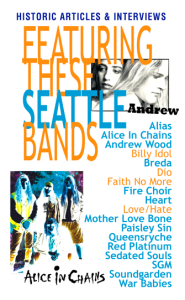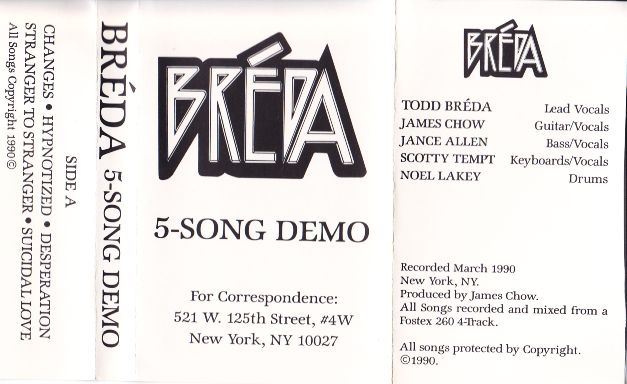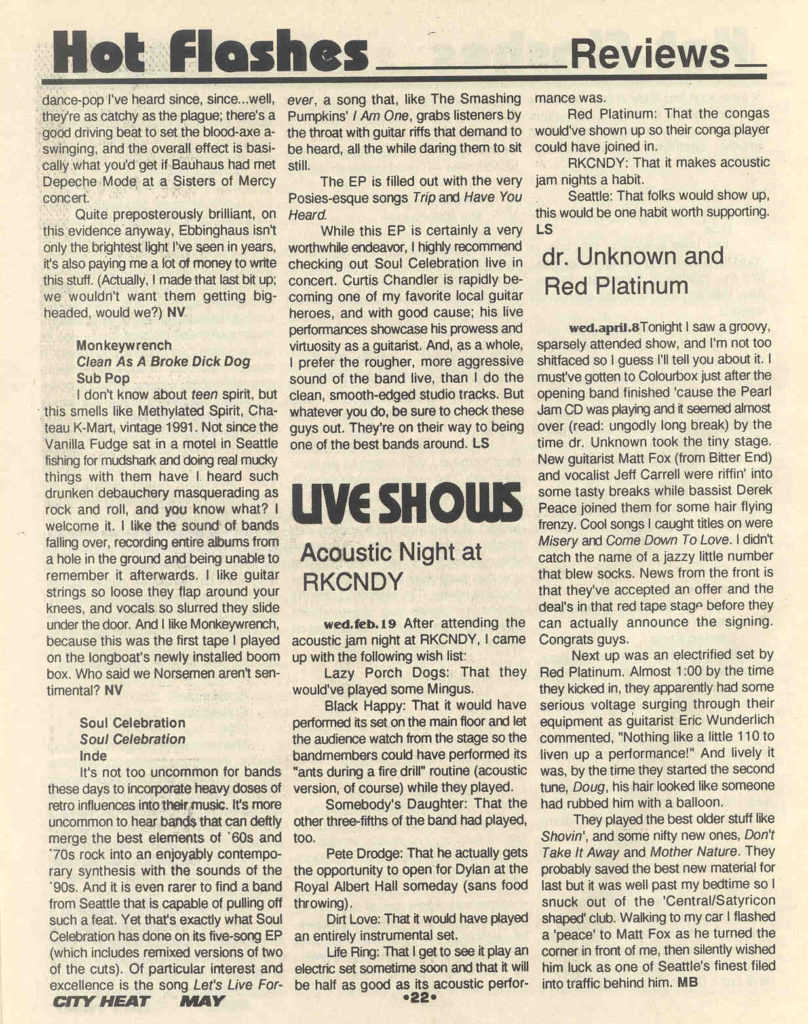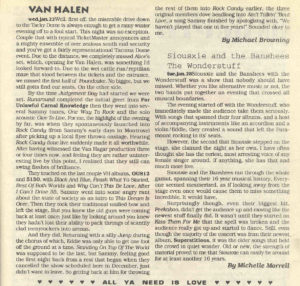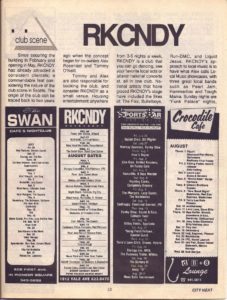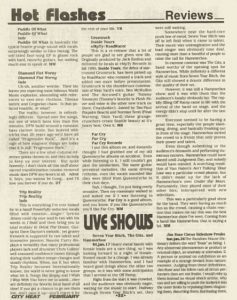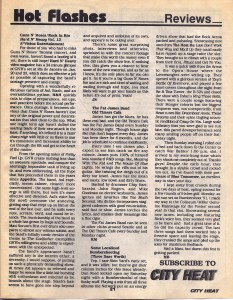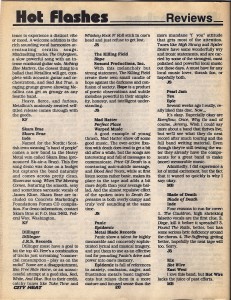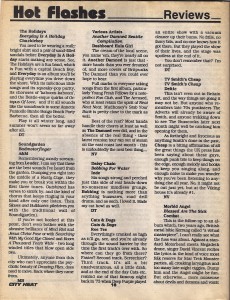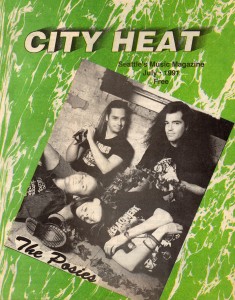
Posies cover City Heat July 1991
It’s Not “All Glitz”
When we last spoke over two years ago it was the beginning of the glitz.
Demo tape, independently released does exceedingly well, major label contract follows quickly, record and release the [major label] debut. No sweat.
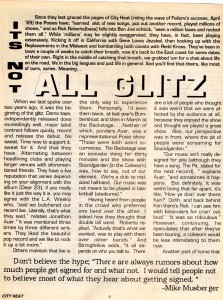
1991.07.CityHeat.Posies1
Time now to support it, sweat for it.
And that they have. Alternating between headlining clubs and playing larger venues with afforementioned friends.
They have a live reputation that varies depending on your alignment with the album (Dear 23). If you really like it just the way it is, you may agree with the L.A. Weekly who, “said we butchered our record live”.
“Literally, that’s what’s they said,” relates Jonathan Auer (guitar/vocals). “It was mentioned three times by three different writers.”
“They liked the beautiful pop record and we like to rock it up a bit more.”
Others maintain that live is the only way to experience them.
Personally, I’d seen them only twice, at last year’s Bumbershoot and then in March at The Backstage. Neither of which, ponders Auer, was a representational Posies show.
“Those were both weird occurrences. The Backstage was an acoustic thing for thirty minutes and the show with Soundgarden (in the Coliseum) was, how to say, out of our element.”
“Our music was not meant to be played in basketball stadiums.”
Having heard from people in the crowd who preferred one band over the other, I asked how they thought that double bill went.
Roberts replied, “Actually, that’s what we wanted, was to play with them over other bands (ostensibly offered as options by Bumbershoot schedulers).”
Stringfellow adds, “It all depends on who you talk to. There are a lot of people who thought it was weird that we were affected by the audience at all because they enjoyed the show and thought we played a great show.
“Also, our perspective was up front where the pit of people were screaminig for Soundgarden.”
“Our music isn’t really designed for pits,(although they have a song, “The Pit”, slated for the next record).” explains Auer, continuing, “and sometimes it happens.”
“But definitely, it was weird being that far apart. It’s like, ‘How ya doin over there, Ken?’ Oohh, and back behind behind Ken there’s Rick. I can see him with binoculars for cryin’ out loud. It was so ridiculous.”
However, continuing, he speculates that after they’ve been touring, a coliseum is less intimidating to them now.
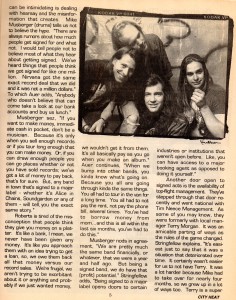
1991.07.CityHeat.Posies2
Another part of home that can be intimidating is dealing with hearsay and the misinformation that it creates.
Mike Musberger (drums) tells us not to believe the hype.
“There are always rumors about how much people get signed for and what not. I would tell people not to believe most of what they hear about getting signed.”
“We’ve heard things that people think we got signed for like, one million. Nirvana got the same exact record deal that we did and it was not a million dollars.”
To which Auer adds, “Anybody who doesn’t believe that can come take a look at our bank accounts… and buy us lunch.”
Musberger sez: “If you want to make money, immediate cash in pocket, don’t be a musician. Because it’s nly when you sell enough records or tour long enough that you can make money.”
“Or, if you can draw enough people you can go places whether or not you have sold records. We’ve got a lot of money to pay back, that’s for sure.”
“But any band in town that’s signed to a major label – whether it’s Alice In Chains, Soundgarden or any of them – will tell you the exact same story.”
Roberts is tired of the misconception that people think they [the major labels] give you money on a platter. It’s like a bank.”
“I mean, we never have been ‘given’ any money. It’s like you approach them with an idea, trying to get a loan.”
“So we owe them back all that money versus our record sales.”
“We’re frugal. We aren’t trying to be exorbitant about it or anything and probably if we just wanted money, we wouldn’t get it from them!”
“It’s all basically ‘pay as you go’ when you make an album.”
Auer continues, “When we bump into other bands, you kinda know what’s going on. Because you all are going through kinda the same things.”
“You all had to tour in the van for a long time. You all had to not pay the rent, not pay the phone bill. Several times.”
“You’ve had to borrow money from Mom. And this is all within the last six months you’ve had to do this!”
Musberger nods in agreement, “We are pretty much the same band – finacially or whatever – that we were a year and a half ago. But being a ‘signed band’, we do have that profit potential.”
Stringfellow adds, “Being signed to a major label opens doors to certain industries or institutions that weren’t open before. Like, you can have access to a major booking agent as opposed to doing it yourself.”
Another door open to ‘signed’ acts is the availability of top-flight management. They’ve stepped through that door recently and went ‘national’ with Tim Neece Management.As some of you may know, they were formerly with local manager Terry Morgan. It was an amicable parting of ways as the rules of the game changed.
Stringfellow explains, “It’s easier just to say that it was a situation that deteriorated over time. “It certainly wasn’t easier for us to not have Terry. It was a lot harder because Mike had to take over for about four months. So we grew up in a lot of ways too.”
“Terry is a super great person but he’d never managed a band on a major label before and I think all five of us were thrown for a loop by what that entailed. So we needed to find someone with the experience who had done that a couple of times.”
And so they did.
Other topics of current interest include Auer’s hand at the helm of what he calls the “Truly” project (including Mark Pickerill and Hiro Yamamoto) and the Posies soon-to-be released single for Popllama.
The single is a tribute to the band Bigstar (anyone hear of Alex Chilton? The Box Tops?) featuring the songs “Feel” and “I Am The Cosmos”.
Like the B side to the single for “Suddenly Mary”, they’ve produced these tracks themselves (at Robert Lange Studios in Richmond Beach). The guys – and their label – have taken a distinct liking to the “hands-on” approach and may just be the Producers of the follow up to Dear 23.
“The record company liked our B sides, that we mixed, better than the record (Dear 23). That was something we did entirely on our own.”
“They thought we caught more of the live energy,” Auer comments.
Do they think that “in-house” production will bring across that live energy better on the next record?
“Most definitely,” he affirms.
“We realized that this is something we are going to be doing for a long time.”
“Touring also made us figure out what works and what doesn’t.”
It can quite safely be stated that The Posies, themselves, work.
Pushing it live on the road, releasing inde singles, and keeping their hands in other projects should keep them busy for a bit.
But in an industry where you’re only as hip as your last album, there’s always more to do.


